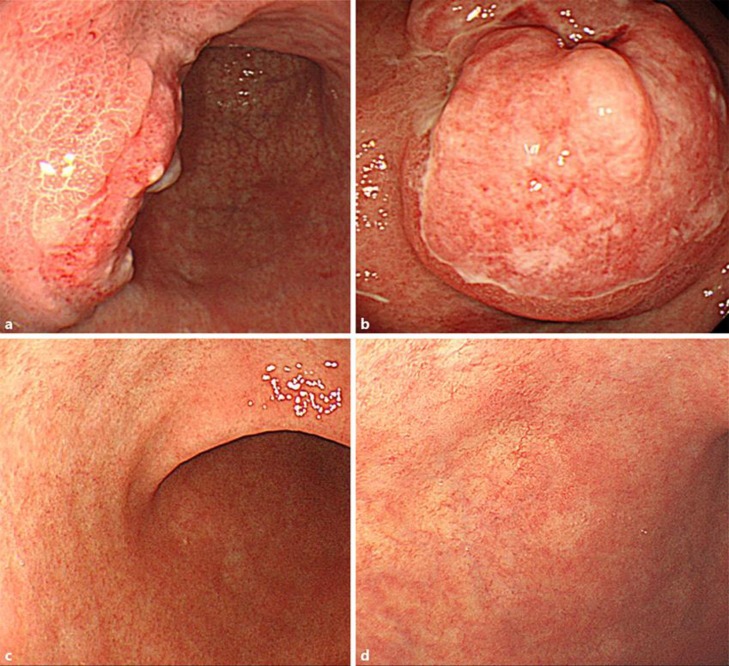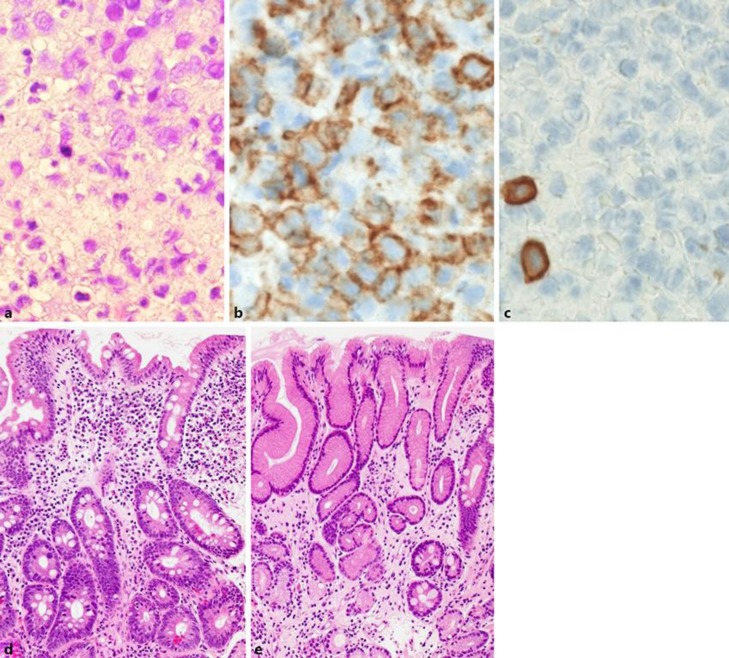Abstract
According to the literature, spontaneous remission of aggressive lymphomas is extremely rare; gastric non-Hodgkin lymphomas, such as mucosa-associated lymphoid tissue lymphomas, often regress due to Helicobacter pylori treatment or no progression, even in a watch-and-wait strategy. Although spontaneous remission of diffuse large B cell lymphomas in the stomach was very rarely reported, the follow-up periods of the cases of spontaneous remission are within 2 years and most cases are likely to relapse after the first remission. Here, we report that a diffuse large B cell lymphoma in the stomach showed spontaneous remission within 2 months after the initial diagnosis and the remission is still continuing for 10 years without any specific treatments against this aggressive lymphoma.
Keywords: Diffuse large B cell lymphoma, Spontaneous remission, Long-term follow-up
Introduction
Diffuse large B cell lymphoma (DLBCL) is an aggressive non-Hodgkin lymphoma. In general, the prognosis of DLBCL is evaluated by the International Prognostic Index (IPI), which is determined by age, serum LDH level, performance status (PS), clinical stage of the disease, and the presence of extranodal sites. When the patient is over 60 years old, the IPI is determined by the clinical stage, LDH level, and PS. The morphological and genetic subtypes are contributing to the therapeutic response. DLBCLs are divided into two types due to their origin: germinal center B cell type (GC) and nongerminal, activated B cell type (non-GC) [1]. Within the gastric non-Hodgkin lymphomas, mucosa-associated lymphoid tissue (MALT) lymphomas constitute around 60% and most of them regressed due to Helicobacter pylori eradication treatment alone and a better prognosis [2, 3]. Localized DLBCLs in the stomach do not regress by H. pylori eradication and need 4–6 cycles of chemotherapy (CHOP) including additional rituximab with/without irradiation. According to the literature, spontaneous remission of aggressive lymphomas is extremely rare. Although spontaneous remission of DLBCL in the stomach was rarely reported, the follow-up periods of those spontaneous remission cases are within 2 years and most cases are likely to relapse after the first spontaneous remission.
Case Presentation
A 62-year-old woman presented to a hospital for health checkup in September 2009. Her physical examination revealed no abnormal findings, no hepatomegaly, no splenomegaly nor lymphadenopathy. The laboratory tests showed the following: RBC counts: 410 × 104, Hb level: 13.9 g/dL, and LDH level: 205 IU/L. Upper gastroduodenal endoscopy showed an elevated tumor with a diameter of 4 cm at the gastric body (Fig. 1a, b). The pathologic diagnosis was a diffuse large B cell non-Hodgkin lymphoma being CD20 and CD79a positive (Fig. 2a, b). Although the scattered normal lymphocytes showed restrictedly positive anti-CD3 antibody (T cell) localized outside large immunoblastic lymphoma B cells, the DLBCL cells were completely negative using the anti-CD3 antibody in immunohistology (Fig. 2c). For further treatment, the patient was consulted at our hospital in October 2009. Her physical examination and her blood test did not show any abnormal findings on admission to our hospital. Her PS was well (0). Abdominal CT and pulmonary CT were conducted for the determination of clinical stage; however, all tests were normal. Gastroduodenal endoscopy was retested, but the tumor in the stomach was not detected any more. Several biopsy specimens taken from the redness of the stomach did not show any findings of lymphoma at all. H. pylori infection was positive. We checked whether there was a sample exchange error at tissue sampling in the previous hospital; however, no mistakes were detected during the endoscopic examination. Because no lymphoma cells were demonstrated, the patient was followed up without treatment and gastroduodenal endoscopy was planned every 3 months for 1 year. During endoscopy performed at 3, 6, 9, and 12 months (Fig. 1c, d), no lymphoma cells were detected in the histology. During the following 3 years, endoscopy was performed every 6 months; however, without detection of lymphomas. Although gastroduodenal endoscopy and blood tests were performed every year, no DLBCL was detected, and she remains well without any evidence of recurrence at around 10 years after the initial diagnosis. Because H. pylori infection was positive and the histology showed intestinal metaplasia as well as gastric atrophy (Fig. 2d), H. pylori eradication treatment was started in June 2018 to reduce the risk of gastric cancer (Fig. 2e).
Fig. 1.
Endoscopic findings at initial diagnosis (a, b). Endoscopic findings 12 months later (c, d).
Fig. 2.
a Histology with HE staining at initial diagnosis (magnification ×400). b Positive staining of lymphoma cells by CD20 antibody in immunohistology (magnification ×600). c Negative staining of lymphoma cells by CD3 antibody in immunohistology. Only a few scattered normal T cells were positive (magnification ×600). d Histology with HE staining on the biopsy taken 12 months later after the initial diagnosis (magnification ×100). e Histology with HE staining in the biopsy tissue taken after H. pylori eradication treatment in 2018 (magnification ×100).
Discussion
Spontaneous remission of aggressive lymphomas is an extremely rare phenomenon [4, 5, 6, 7]. Gattiker et al. [5] retrospectively reviewed 209 cases of aggressive lymphomas including 140 cases of nodular lymphoma and 69 cases with DLBCLs. They reported that there was no spontaneous remission of DLBCLs, although 2 cases showed a short-term regression after irradiation or intensive chemotherapy but no cases without treatment. Tamás et al. [6] first reported that the localized (root of the tongue) DLBCL continued under spontaneous remission without any treatment for 7 years. This case reports a long-term spontaneous remission of DLBCL. Watari et al. [7] reported 2 cases of spontaneous remission of DLBCL in the stomach. One case was a solitary aggressive lymphoma 2 cm in size in the stomach and it regressed spontaneously 74 days later after taking H2 receptor antagonist. Another case was taking H2 receptor antagonist and H. pylori eradication treatment for 2 months before spontaneous remission. They proposed that a careful long-term follow-up of patients taking H2 receptor antagonist or of those treated by H. pylori eradication is one option even in case of gastric aggressive lymphoma. However, the duration of spontaneous remission of DLBCLs is generally short and most of them are likely to relapse after spontaneous remission during long-term follow-up. Our case is a DLBCL localized in the stomach. It showed spontaneous remission with no treatment within 2 months and the remission is continuing for around 10 years. Although the mechanism of spontaneous remission remains obscure, some spontaneous remission has been associated with viral infection [8] and remission occurring after diagnostic biopsy without therapy may be attributed to an immunological response by the host. In general, DLBCLs require chemotherapy and/or irradiation. The response depends on the phenotype, i.e., GC or non-GC type [1] and MYC or BCL2 expression [9]. However, the mechanism of spontaneous remission is not clear by now. A recent suggestive mechanism might be the presence of immune checkpoint receptors (PDL-1/PD-1) on immune cells [10] around the lymphoma cells. However, this still needs to be investigated in the future.
Statement of Ethics
The patient has given informed consent for publication.
Disclosure Statement
The authors declare that there is no conflict of interest regarding the publication of this article.
References
- 1.Anderson JJ, Fordham S, Overman L, et al. Prognostic impact of immunohistochemically defined germinal center phenotype in diffuse large B-cell lymphoma patients treated with immunochemotherapy. Int J Oncol. 2009;35:961–71. [Google Scholar]
- 2.Nakamura S, Sugiyama T, Matsumoto T, Iijima K, Ono S, Tajika M, et al. JAPAN GAST Study Group Long-term clinical outcome of gastric MALT lymphoma after eradication of Helicobacter pylori: a multicentre cohort follow-up study of 420 patients in Japan. Gut. 2012 Apr;61((4)):507–13. doi: 10.1136/gutjnl-2011-300495. [DOI] [PubMed] [Google Scholar]
- 3.Sugizaki K, Tari A, Kitadai Y, Oda I, Nakamura S, Yoshino T, et al. Anti-Helicobacter pylori therapy in localized gastric mucosa-associated lymphoid tissue lymphoma: A prospective, nationwide, multicenter study in Japan. Helicobacter. 2018 Apr;23((2)):e12474. doi: 10.1111/hel.12474. Epub ahead of print. [DOI] [PMC free article] [PubMed] [Google Scholar]
- 4.Horning SJ, Rosenberg SA. The natural history of initially untreated low-grade non-Hodgkin's lymphomas. N Engl J Med. 1984 Dec;311((23)):1471–5. doi: 10.1056/NEJM198412063112303. [DOI] [PubMed] [Google Scholar]
- 5.Gattiker HH, Wiltshaw E, Galton DA. Spontaneous regression in non-Hodgkin's lymphoma. Cancer. 1980 May;45((10)):2627–32. doi: 10.1002/1097-0142(19800515)45:10<2627::aid-cncr2820451023>3.0.co;2-0. [DOI] [PubMed] [Google Scholar]
- 6.Tamás L, Sári E, Répássy G, Szabó P, Bagdi E, Krenács L, et al. Spontaneous remission in localized diffuse large B-cell lymphoma. Pathol Oncol Res. 2011 Sep;17((3)):779–84. doi: 10.1007/s12253-011-9379-6. [DOI] [PubMed] [Google Scholar]
- 7.Watari J, Saitoh Y, Fujiya M, Nakamura K, Inaba Y, Okamoto K, et al. Spontaneous remission of primary diffuse large B-cell gastric lymphoma. J Gastroenterol. 2005 Apr;40((4)):414–20. doi: 10.1007/s00535-004-1561-0. [DOI] [PubMed] [Google Scholar]
- 8.McCabe MG, Hook CE, Burke GA. Spontaneous regression of an EBV-associated monoclonal large B cell proliferation in the mastoid of a young child following surgical biopsy. Pediatr Blood Cancer. 2008 Oct;51((4)):557–9. doi: 10.1002/pbc.21637. [DOI] [PubMed] [Google Scholar]
- 9.Potts DA, Fromm JR, Gopal AK, Cassaday RD. Spontaneous remission of an untreated, MYC and BCL2 co-expressing, High-grade B-cell lymphoma: A case report and literature review. Case Rep Hematol. 2017;2017:2676254. doi: 10.1155/2017/2676254. [DOI] [PMC free article] [PubMed] [Google Scholar]
- 10.Tsirigotis P, Savani BN, Nagler A. Programmed death-1 immune checkpoint blockade in the treatment of hematological malignancies. Ann Med. 2016 Sep;48((6)):428–39. doi: 10.1080/07853890.2016.1186827. [DOI] [PubMed] [Google Scholar]




